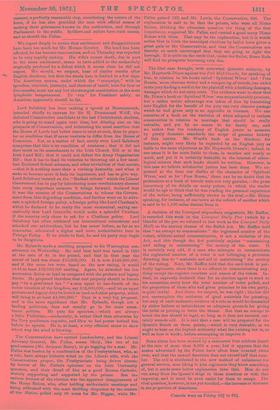Lord Salisbury has been making a speech at Bournemouth, intended
chiefly to canvass for Sir H. Drummond Wolff, the defeated Conservative candidate at the last Christchurch election, who is going to stand again next time, but dilating also on the prospects of Conservatism, and reiterating his usual assertion that the House of Lords had better cease to exist at once, than be popu- lar on condition that iC never ventures to differ from the House of Commons. Yet, as a matter of fact, surely even Lord Salisbury recognises that this is its condition of existence ; that it did not dare insist on its amendments to the Irish Church Bill or to the Irish Land Bill ; that it could not defeat the Army Organisation Bill ; that it has to limit its victories to throwing out a few excel- lent Endowed School schemes, and other trivialities of that nature, —that it is nothing more than a revising Assembly, and when it -seeks to become more it feels its impotence, and has to give way. Lord Salisbury insisted on the "Radical tribute" which the Liberal Government has to pay by introducing some revolutionary element into every important measure it brings forward, declared that it was the mission of the Conservatives to release the Govern- ment from this degrading condition, and further went on to advo- cate a spirited foreign policy, a foreign policy like Lord Chatham's, wbich he declared to be really the most economical, saying sar- castically that Lord Granville would make a splendid Chatham if the country only chose to ask for a Chatham policy. Lord Salisbury has often criticised our international concessions and attacked our arbitrations, but he has never before, as far as we remember, advocated a higher and more authoritative tone in Foreign Policy. If he sticks to that, he and his party may begin to be dangerous.


































 Previous page
Previous page